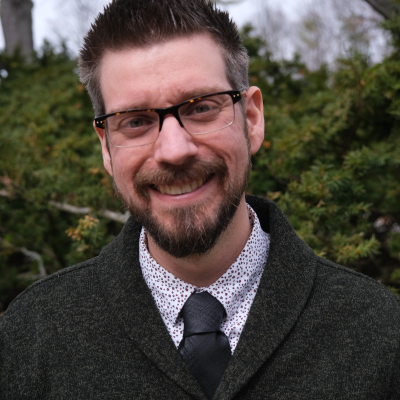
Ensure Water Security for Healthy People, Animals, and Planet Wade Syers, MSU Extension Food Safety specialist, adjunct faculty for MSU’s Institute of Agricultural Technology

Wade Syers, Ph.D.
Wade Syers knows food and water safety are inextricably linked. As an MSU Extension food safety specialist, he’s focused on human health and how it’s impacted by what people ingest. Water quality and its impact on health overlaps into his work. Syers and his team take their research out in the field, working with educators on public presentations and developing evaluation tools.
Here's how he answered a few questions from the Water Alliance.
What interested you in this particular hub?
At the Extension, it’s our mission to better people’s lives through education and bring them the knowledge resources of a vast, Big 10, land grant university. The chance to work with people who are interested in water safety and how that affects people’s health, the environment, and water security was very appealing. All of these issues overlap and dovetail so nicely. It was an opportunity that I couldn’t pass up.
How do we ensure the Water Alliance doesn’t just talk about problems, but does something about them?
We have a very diverse group of people in the Water Alliance. We have people who work in education and outreach. We have researchers, professors, community members who are involved in different ways. There’s an External Advisory Committee with people from a variety of backgrounds. I think it’s that diversity of perspectives that’s going to help fuel the Water Alliance’s future successes and generate excitement around water. This group was put together in a very thoughtful way, and I think that the considerations for longevity were there in its creation.
What problems/issues to envision your hub taking on?
One thing that instantly comes to mind for most people when I talk to them about water and health is the Flint water crisis. We have contaminants like lead, and a few years ago, people in Michigan became concerned about PFAS (per- and polyfluoroalkyl substances). With the climate changing, there’s the possibility for increased contaminants too.
Even in our group, we have that diversity of perspectives. There are people whose focus is water security, and we have people focused on how environmental contaminants affect people and the environment, and the sustainability issues behind that. My question in everything is always, how does this affect people and their health? I think there’s going to be a synergy, where we’re going to deal with issues on a grander scale than any one of us has been able to focus on previously. I think that collaboration and coming together with the different perspectives will help us get our arms around how these water issues affect people and health.
How do you think an interdisciplinary group is better equipped to approach those challenges than a siloed approach?
I think it’s because of that interdisciplinary approach that we’ll pick up on things that otherwise would get missed. When we sit down with different perspectives, we get that varied expertise. For example, one person might bring up social determinants of health in an area, while another might talk about health equity issues. Others will focus on point source and nonpoint source pollutants. All of these issues can interact, so when we discuss that in the early stages, it helps us cover issues that might fall through the cracks. If you’re only focused on whatever your area of expertise is, you may not be able to see how it affects everybody in the big picture.
Why do you think MSU is uniquely positioned to create solutions?
In addition to our varied expertise at MSU, we’re also positioned to work with communities around the state. MSU Extension is in almost every single county in Michigan. There are people who know the local issues of the area where they work. Being in the communities is a huge advantage, and a lot of other organizations don’t have that luxury. Whether you’re in Lansing or a rural area, there are so many types of issues possible, and it’s really exciting to be part of a group where we know what the issues are and hopefully have the expertise to handle them.
What are some ideas for potential hub projects?
I’d like to see a direct education piece that brings whatever new knowledge that we discover to the people. I think that’s one of the most important aspects of scholarship, being able to share information with everyone in ways they can use and understand. It’s wonderful to expand knowledge in a field, and other scientists can build off that knowledge. But what impact does it have if the people aren’t able to use the information? It’s about increasing our impact and increasing people’s quality of life.
One year from now, what do you hope your hub has accomplished?
I want to be able to say that the health hub in the Water Alliance made an impact and we bettered peoples’ lives. Without naming specific projects, I hope that we accomplish whatever goal we set, but at the end of the day, I hope we help people.